The Celluloid Musashi Part III:
More War-Time Musashi
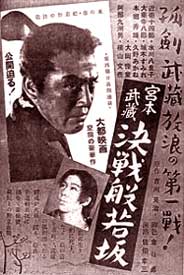 Another 1940s film about Musashi's life was Decisive Battle; aka, Duel at Hannya Slope (Kessen Hannyazaka, Shochiku/Daito, 1942). It was directed by Kozaburo Yoshimura & Teruo Hagiyama, the former a highly regarded director (A Tale of Genji, 1951; An Osaka Story, 1957).
Another 1940s film about Musashi's life was Decisive Battle; aka, Duel at Hannya Slope (Kessen Hannyazaka, Shochiku/Daito, 1942). It was directed by Kozaburo Yoshimura & Teruo Hagiyama, the former a highly regarded director (A Tale of Genji, 1951; An Osaka Story, 1957).
This time Musashi was played by Jushiro Konoe, probably best known for his series of films about Yagyu Jubei. Many of his films were young-adult fare, but he gave a severe mature performance as Musashi.
His physical acting style is much like Toshiro Mifune's & Chiezo Kataoka's, their appearances rugged yet handsome. Konoe, in numerous jidai geki period films, is probably the originator of the scruffy heroic type which the West did not come to know until Mifune did Yojimbo (Toho, 1961).
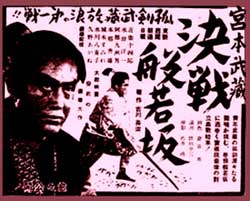 Yet Decisive Battle does not take advantage of Konoe in this regard, as once again we see a well-groomed Musashi rather than history's slob, though Konoe maintained a scowling look to suggest a miserable sod the opposite of the sort of happy-go-lucky samurai he often played. Yet Decisive Battle does not take advantage of Konoe in this regard, as once again we see a well-groomed Musashi rather than history's slob, though Konoe maintained a scowling look to suggest a miserable sod the opposite of the sort of happy-go-lucky samurai he often played.
Japan was at this time up to its arse in war. The very word Kessen bore war-time intensity of meaning, a fight without quarter or possibility of withdrawal, to an absolute conclusion, win or lose.
Musashi had been fashioned a hero for the times, rather than all times, embodying feudal values & warrior strength of a nation in a specific decade desirous of empire & obedience in citizens willing to die for a pretty lousy cause.
War-time requirements assisted in the "cleaning up" of Musashi's historical self into a nobler sort of samurai, for the military government could cause filmmakers a lot of grief if heroes were imperfect.
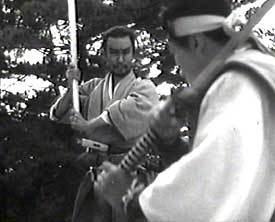 Kenji Mizoguchi's wartime Musashi Miyamoto the Swordsman (Miyamoto Musashi, Shochiku, 1944) survived McArthur's torch. It was based on a serial story by Kan Kikuchi published in the special war section of the national newspaper Mainichi shinbun, influenced by but quite different from the Eiji Yoshikawa novel upon which most film versions from the war onward would be based. Kenji Mizoguchi's wartime Musashi Miyamoto the Swordsman (Miyamoto Musashi, Shochiku, 1944) survived McArthur's torch. It was based on a serial story by Kan Kikuchi published in the special war section of the national newspaper Mainichi shinbun, influenced by but quite different from the Eiji Yoshikawa novel upon which most film versions from the war onward would be based.
Yoshikawa had refashioned Musashi into a humble seeker after enlightenment via Zen of the Sword, & Kikuchi amped up the level of spiritual nobility, believing as he did that Musashi was the greatest philosopher of his era. Both authors' perspective on Musashi made him just the fellow to suit the propaganda needs of the day. The script was by Matsutaro Kawaguchi who wrote many propagandistic screenplays during the war.
Mizuguchi was not excited about making this film. The military was fully prepared to ruin Shochiku if the studio didn't produce appropriate films in support of the war. And directors had been known to be drafted to the war-front to die if they upset the government's war-mentality. Mizoguichi would later admit to having made Musashi Miyamoto to avoid the draft.
Audie Bock in Japan Film Directors (Kodansha, 1978) remarked that Mizoguchi has Musashi's woman student (Kinuyo Tanaka) come across rather decently, something that cannot be said of any other directors' versions. So Mizoguchi was able to put something of his personal vision into a film even though forced to glorify military spirit.
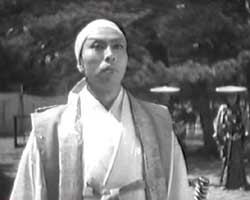 He starred Kinuyo Tanaka in several of his films, & his attitudes toward women has occasionally gotten him described as a limited sort of feminist. In this film Tanaka plays the woman avenger Shinobu who together with her brother Genichiro (Kigoro Ikushima) seek out Musashi to become his disciples, so that they might become sufficient fencers to obtain vengeance for their slain father. He starred Kinuyo Tanaka in several of his films, & his attitudes toward women has occasionally gotten him described as a limited sort of feminist. In this film Tanaka plays the woman avenger Shinobu who together with her brother Genichiro (Kigoro Ikushima) seek out Musashi to become his disciples, so that they might become sufficient fencers to obtain vengeance for their slain father.
They first find him in a temple carving a wooden boddhisattva. He tells them, "I commend your spirit, but I cannot help you" for he has been issued a challenge to duel at Ichijoji & may not survive.
He keeps his apointment for what is essentially an ambush by all the students of a dojo whose instructor he had previously bested.
We're shown Musashi's two-sword style as he cuts down several men, but very quickly Mizoguchi jump-cuts to the aftermath of Musashi gazing at his sword by a waterfall. Mizoguchi's reluctance to capture much of the story's violence on screen, & his sympathy for the heroine, renders his version lowkey & tasteful.
He includes barely enough action that it will not disappoint viewers interested in the swordplay, unlike his wartime version of Chushingura: The Loyal 47 Ronin (Genroku Chushingura, 1941), likewise made due to pressures from the military government, but which almost as an act of personal rebellion radically frustrates the viewer's desire for at least a moment of bloodshed.
Mizoguchi was able, to a small degree, to exercise his interest in correct historical detail. He had Kawarazaki capture the exact physical appearance of Musashi as evidenced in a surviving self-portrait.
This can be a little incongruous, since the self-portrait was of Musashi at age sixty-six, whereas the events of the story by most fictional accounts took place much earlier in his life.
Still, for once we see a Musashi with his hair hanging loose as he actually wore it. In old age a samurai's loose hair would've been an acceptible signal of retirement, but Musashi had looked retired even when young.
Kawarazaki is exquisit in his gaunt beauty for this role. He does not convey so much a scruffy Musashi as he does a man at ease, whose interests do not include ornate dress or hair care, though he's otherwise tidy. He has the aspect of a calm, possibly melancholy philosopher.
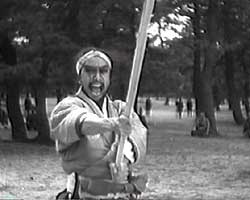 The two would-be avengers follow Musashi & serve him even though he again tells them he cannot teach them swordsmanship since his lessons are not for the sake of revenge. "I teach it for the Way," & for no other purpose. Shinobu thus assures Musashi she & her brother Matachiro will put aside thoughts of vengeance until later, & follow his teachings in the spirit he intends. The two would-be avengers follow Musashi & serve him even though he again tells them he cannot teach them swordsmanship since his lessons are not for the sake of revenge. "I teach it for the Way," & for no other purpose. Shinobu thus assures Musashi she & her brother Matachiro will put aside thoughts of vengeance until later, & follow his teachings in the spirit he intends.
He relents & begins his instruction, lessons rich in aphorisms taken from Musashi's actual writings. When the vile rogues who killed the siblings' father learn Musashi is teaching them swordsmanship, they become duly frightened, & seek the assistance of Kojiro Sasaki (Kanemon Nakamura).
Kojiro is a haughty sword instructor who heads up the Ganryu dojo. He would not ordinarily agree to assist such men, but he seeks any excuse to duel Musashi. He thus hatches an appalling plan to kill young Genichiro, sparing Shinobu only so that she can inform Musashi who killed her brother.
This is perhaps the only meanspirited version of Kojiro in the cinematic cannon. Before wartime novels revamped both Musashi's & Kojiro's characters, in the older legends Musashi was in fact seeking vengeance for the death of his own father, & Kojiro was an older man sharing responsibility for his death. But as the story came more popularly to be told, Kojiro was younger than Musashi, naive & beautiful, more like an actor than a swordsman in his dandified dress, but as devoted as Musashi to the spiritual aspect of duelling.
In Mizoguchi's film, however, his dandy traits are subdued. He's a more severe sort of fellow, capable of killing an innocent young man merely to make Musashi fight him. And while Musashi makes a big to-do of never fighting for revenge, in fact there is an element of wanting to achieve revenge in Shinobu's behalf, so that her own spirit need not be harmed by such matters.
Thus on the way to the climactic duel, he takes advantage of the opportunity presented by the criminal Samoto brothers themselves, who foolishly try to kill Musashi. He swiftly cuts them down, then sets out for Ganryu Island to duel Kojiro. While in the boat, he takes his shortsword & carves an oar into a bokken or wooden sword.
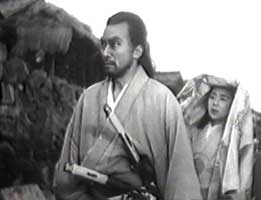 Moody cinematography & a score to match makes all this very beautiful to watch & hear. But one hopes for an actual duel instead of another philosophy lesson, & Mizoguchi does present the confrontation between Kojiro & Musashi suspensefully & well, a nice balance of action spiced with Musashi sharing hostile bits of sword-philosophy. Moody cinematography & a score to match makes all this very beautiful to watch & hear. But one hopes for an actual duel instead of another philosophy lesson, & Mizoguchi does present the confrontation between Kojiro & Musashi suspensefully & well, a nice balance of action spiced with Musashi sharing hostile bits of sword-philosophy.
Even so, the encounter is a little perfunctory, & when the duel is engaged along the margins of the water, Musashi needs only one strike to fell Kojiro.
In the coda, Musashi counsels even himself, in Shinobu's presence, that swordsmanship is a lifelong pursuit, & his victory against Kojiro was imperfect. There was a "hesitation" in his spirit, probably due to the ingredient of vengeance that made the encounter less than wholeheartedly about enlightenment.
Shinobu herself declares that she will become a nun to devote her life to prayer for the souls of her father & brother. Musashi's impressed with her bold decision, & promises that in consequence he will never take a bride, though until that moment there was no reason in the story to assume a romantic link between them. He asserts, "I'll consider you my wife in spirit," then walks on down the road, all the more intensely committed to perpetual training.
There would be no version of Musashi's life filmed during the Occupation, since MacArthur forbade feudal drama. After MacArthur was recalled, Japanese period drama returned with a passion, including new versions of Musashi's life & legend.
copyright © by Paghat the Ratgirl
|
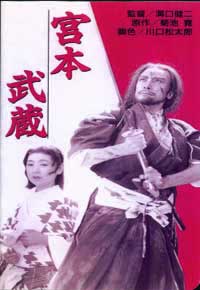

 Yet Decisive Battle does not take advantage of Konoe in this regard, as once again we see a well-groomed Musashi rather than history's slob, though Konoe maintained a scowling look to suggest a miserable sod the opposite of the sort of happy-go-lucky samurai he often played.
Yet Decisive Battle does not take advantage of Konoe in this regard, as once again we see a well-groomed Musashi rather than history's slob, though Konoe maintained a scowling look to suggest a miserable sod the opposite of the sort of happy-go-lucky samurai he often played.
 He starred Kinuyo Tanaka in several of his films, & his attitudes toward women has occasionally gotten him described as a limited sort of feminist. In this film Tanaka plays the woman avenger Shinobu who together with her brother Genichiro (Kigoro Ikushima) seek out Musashi to become his disciples, so that they might become sufficient fencers to obtain vengeance for their slain father.
He starred Kinuyo Tanaka in several of his films, & his attitudes toward women has occasionally gotten him described as a limited sort of feminist. In this film Tanaka plays the woman avenger Shinobu who together with her brother Genichiro (Kigoro Ikushima) seek out Musashi to become his disciples, so that they might become sufficient fencers to obtain vengeance for their slain father. The two would-be avengers follow Musashi & serve him even though he again tells them he cannot teach them swordsmanship since his lessons are not for the sake of revenge. "I teach it for the Way," & for no other purpose. Shinobu thus assures Musashi she & her brother Matachiro will put aside thoughts of vengeance until later, & follow his teachings in the spirit he intends.
The two would-be avengers follow Musashi & serve him even though he again tells them he cannot teach them swordsmanship since his lessons are not for the sake of revenge. "I teach it for the Way," & for no other purpose. Shinobu thus assures Musashi she & her brother Matachiro will put aside thoughts of vengeance until later, & follow his teachings in the spirit he intends. Moody cinematography & a score to match makes all this very beautiful to watch & hear. But one hopes for an actual duel instead of another philosophy lesson, & Mizoguchi does present the confrontation between Kojiro & Musashi suspensefully & well, a nice balance of action spiced with Musashi sharing hostile bits of sword-philosophy.
Moody cinematography & a score to match makes all this very beautiful to watch & hear. But one hopes for an actual duel instead of another philosophy lesson, & Mizoguchi does present the confrontation between Kojiro & Musashi suspensefully & well, a nice balance of action spiced with Musashi sharing hostile bits of sword-philosophy.